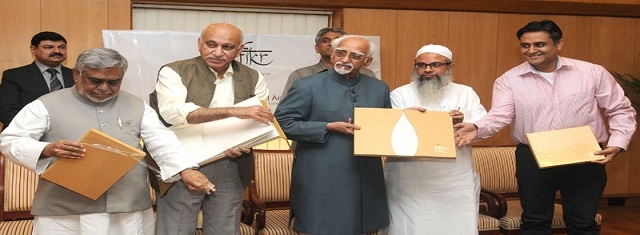News
Vice President Releases The Book “˜Fikr´
National Institute of Faith Leadership

Book releasing ceremony (Source: PIB/GR/TYP/BIN/USPA/WN/IAIJ)
USPA NEWS -
The Vice President, Mr. M. Hamid Ansari releasing the book titled ?Fikr? brought out by the National Institute of Faith Leadership, in New Delhi on April 26, 2016.
“˜Thinking Minds Should Look Beyond Questions Of Identity And Dignity In A Defensive Mode´
“˜Thinking Minds Should Look Beyond Questions Of Identity And Dignity In A Defensive Mode´
The Vice President of India, Mr. Mohd. Hamid Ansari has said that Indian experience of a large Muslim minority living in secular polity having a composite culture could be a model for others to emulate. He was addressing the gathering at the event of releasing the book titled “˜Fikr´ brought out by National Institute of Faith Leadership, on April 26.
The Vice President said that the book is an effort to remove the popular and prejudiced impressions about Islam as a faith and Muslims as a people. Quoting the Algerian-French philosopher Mohammed Arkoun, the Vice President said that it was the challenge of our times to rethink modernity so that, critical thought, anchored in modernity but criticising modernity itself and contributing to its enrichment through recourse to the Islamic example could open up a new era in social movements.
The Vice President suggested that thinking minds should look beyond questions of identity and dignity in a defensive mode and explore how both can be furthered in a changing India and a changing world. He added that this would necessitate sustained and candid interaction with fellow citizens and the actual implementation of the principles of justice, equality and fraternity inscribed in the Preamble of the Constitution and the totality of Fundamental Rights.
Doruvu Paul Jagan Babu New Delhi India Vice President Mohd. Hamid Ansari Fikr National Institute Of Faith Leadership Composite Culture
Liability for this article lies with the author, who also holds the copyright. Editorial content from USPA may be quoted on other websites as long as the quote comprises no more than 5% of the entire text, is marked as such and the source is named (via hyperlink).





